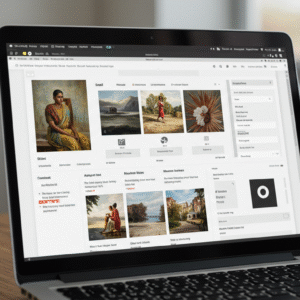This article may contain references to products or services from one or more of our advertisers or partners. We may receive compensation when you click on links to those products or services. Nonetheless, our opinions are our own.
The information presented in this article is accurate to the best of our knowledge at the time of publication. However, information is subject to change, and no guarantees are made about the continued accuracy or completeness of this content after its publication date.
- Why Budgeting Matters During a Career Change
- Introduction
- Money Impact of Changing Jobs
- Common Financial Challenges to Expect
- Check Your Finances Before Changing Jobs
- Know Where Your Money Goes Before You Make a Change
- Spot Financial Gaps During Transition
- Budgeting Tips for Job Switches
- Get Your Tools and Resources Ready
- Create a Transition Budget in Four Steps
- Final Thoughts
- Frequently Asked Questions
- Recommended Reads
Why Budgeting Matters During a Career Change
- Moving to a new job or changing what you do at work can bring money problems, so making a budget is very important to keep things steady.
- The money you have saved from your job, what you spend, and your emergency fund are important when you are switching jobs.
- Having a budget helps you get ready for times when you get less money or have bills you did not expect as you get used to your new job.
- People changing jobs need to look at where there might be gaps, like health insurance or what they get from work, and plan for those things.
- Taking things step by step, like checking your spending and building your emergency fund, can make the new money situation easier.
Introduction
Switching roles in your career can be exciting, but it can also feel hard on your wallet. When you go to a new job or try a new line of work, you need to know how to handle your money. A new job can give you a chance to grow, but you may also face things like changes in pay and costs you did not see coming. If you budget in a smart way, you can get ready for this shift and feel better about it. So, how can you make this career change work with your money? Let’s break it down.
Money Impact of Changing Jobs
When you think about changing jobs, it’s good to look at how it could change your money and life. A new job may come with a different pay, new things you get from work, and other costs or savings. Take time to know what you might make, what you might spend, and what you will get for changing jobs. This can help you feel sure in what you pick for your work and money.
Changing jobs can change your money in a few big ways. Your new job might give you more or less pay. You could also lose some benefits. You may also have to spend money on things like getting to work or moving.
When you leave your current job, there could be times when you get less pay or don’t have health insurance. There could also be a break in adding to your retirement savings, mainly if you have to wait before you start the new job.
Your new job can give you better pay or chances to move up. But the move to this role is not always easy. Costs like getting to work, moving to a new place, or extra classes can surprise you. If you get ready for these changes, you can deal with the money problems better.
Common Financial Challenges to Expect
Changing jobs can bring problems that people may not see right away. A big worry for many who change their career is the time when they have no money coming in between jobs. If you do not plan your money well, these times can use up your savings or emergency fund.
Benefits such as health insurance and retirement money can stop for a while when you leave your job. A lot of places make you wait before you get these benefits in a new job. You should plan for this time so you do not have any surprise costs that come out of your own pocket.
Relocation costs, changes in commuting, or money spent on new professional certifications for reskilling can be hard on your budget. These costs are usually one-time, but they can feel heavy and use up money you may need for other things. When you plan carefully for these challenges, it will help make the change smoother for you.
Check Your Finances Before Changing Jobs
Before you move on to your next job, it is important to check your money situation. Take a close look at the way your current pay covers what you spend each month. A good budget helps you see if you have enough savings to help you make this change.
Look at your workplace and what benefits it gives, like retirement plans or money you get back. Find out what you will keep and what you will lose if you leave. Knowing these things will help you decide how to save money for the change. If you do not see your money clearly, it is hard to plan your next job move well. But when you know where you stand, you can make a good plan for your career change.
Voted "Best Overall Budgeting App" by Forbes and WSJ
Monarch Money helps you budget, track spending, set goals, and plan your financial future—all in one app.
Get 50% OFF your first year with code MONARCHVIP
Know Where Your Money Goes Before You Make a Change
Start by looking at the money you get each month and what you spend it on. Are you able to save some every month? If you know what part of your pay is used for basics, it will help you handle changes if you switch jobs.
Make a list of all the things you must pay for, like rent, bills for things like water or power, and groceries. Also, add the things you want but do not need, like eating out or spending money on a trip. This can help you see what you have to keep paying for and what you can stop for a while if you need to save money during this time.
You need to look at your savings too. Ask yourself if you have enough money to get by for a few months without a job. Make sure to add money to your emergency fund before you change jobs. When you know how much you get, spend, and save, you can make better choices with your budget.
Spot Financial Gaps During Transition
Job changes can cause gaps in your money and things you get from work, like health care. Before you leave your job, find out how long your savings will last if you have no pay. Think about if your emergency fund is enough for any surprise costs that come up.
Think about times when your new job is slow to set up benefits like health insurance. There may be a time when you do not have any coverage. If you get sick or have an accident in this time, it can cost you a lot. You can take short-term health coverage or use COBRA insurance. This can help fill any gaps in your coverage.
Also, you may run into surprise costs like new certifications, changes in your trip to work, or fees for moving when you start a new job. Make a budget for these things so your money stays safe. If you plan ahead, it is easier to handle these gaps instead of feeling stressed about them.
Budgeting Tips for Job Switches
Creating a budget when you change jobs does not have to feel hard. Start with easy steps. Put your spending into two groups. One is for things you need, and the other for things you just want. Make sure you keep your savings for emergencies. Do not use that money for anything else.
Set goals that you can reach based on the money you have coming in right now, and keep doing this until you get used to what your new job pays. When you have a strong plan for your money, you can stay away from problems that people often have when they change jobs. Little steps can help you avoid surprises that could cost you a lot more in the future.
Get Your Tools and Resources Ready
Here is what you need to have before you start. Make sure you get all the needed documents, tools, and resources ready. This will help you start your work in the right way. It also lets you save time and avoid problems. If you have these items with you, you will feel more sure and ready to go.
Get your documents, tools, and other resources now to make your work easy and smooth.
Moving into a new job path takes good planning and order. Start by getting important papers like your resume, cover letters made for each job you want, and reviews from your current job. The use of LinkedIn and other work-related sites can help you meet people in the same field. Also, look at tools like online classes or workshops. These can help you learn fresh skills, mainly in areas like data science. Doing this will make the job switch smoother and get you ready for what comes next.
Create a Transition Budget in Four Steps
1. Calculate Your Expected Income Changes
It is important to know how your earnings will change. Take a look at how your current money compares to what you expect to get at your new job. Here is a simple table to show this:
| Factor | Current Job | New Job |
|---|---|---|
| Monthly Salary | $4,000 | $4,700 |
| Bonus/Commission | $1,000 | $1,500 |
| Benefits (health & matching) | Covered | Activation after 3 months |
| Annual Total Estimate | $60,000 | $65,000 |
This side-by-side look helps you see if making the switch makes things better or changes how much money you need. If you lose any money before you get used to your new pay, you may need to change the way you spend or save.
2. List Necessary and Optional Expenses
Split the important costs from the optional ones while you go through your change:
| Necessary | Optional | Semi-Important |
|---|---|---|
| Rent, utilities, groceries, loan payments | Entertainment, dining out, subscriptions | Transport, unexpected job-related purchases like certification fees |
This way of sorting things can help you cut out things you do not need to buy. First, make sure you cover what you need and set some money aside for times when things go wrong. If you stop spending on things you can live without, you will not feel money pressure when your pay is late or something is held up.
3. Build an Emergency Fund for Unexpected Costs
This step is all about setting aside some money for things you do not expect, like car repairs or doctor visits. The purpose is to have some extra cash saved so that you can handle any surprises without worry. If you put a little money away each month, you will feel better knowing you have something to fall back on if times get tough. It is a good idea to get to the point where you have enough saved up to cover a few months’ worth of costs. That way, if anything happens, you can feel ready and safe.
4. Adjust Your Budget as You Settle into Your New Job
After you start your new job, you may need to change your budget. This is a good time to look at what you make and what you spend. It can also help you figure out what you want to save or buy. If your pay or your bills are different now, make sure to update your budget. This will help you know where the money goes and what you have left each month. Over time, your budget can help you get the most out of your income.
Final Thoughts
Changing jobs can feel exciting, but it can also make you feel worried. This is true, especially when you think about your money. Take time to see how your money looks right now. Then, make a plan so you know what you spend and save as you start this new job. A budget will help you feel sure about what to do if things cost more than you thought.
When you have some money saved for emergencies, you will feel better while starting this next part of your work life. By planning ahead and being active with your choices, you can get the most out of this change at work and keep your money safe.
Frequently Asked Questions
How much should I save before switching jobs?
It’s a good idea to save enough money to cover three to six months’ basic living costs before you move to a new job. This money will help you handle times when you don’t get paid, when bills come up that you didn’t expect, or if you are not working for a while. Planning your savings this way will help you have financial stability during and after you leave your last job.
What expenses are commonly overlooked during a job change?
Many people forget about things like moving costs, staying somewhere for a short time, paying for new work certificates, and the time before your new job’s benefits begin. You may also have higher travel costs or need new clothes for work. Thinking about these costs ahead of time will help make the job change feel easier for you.
How do I handle gaps in health insurance or benefits?
You might want to look at options such as COBRA to keep your current health plan for a while or buy a short-term plan. Check early to see when your new job’s benefits begin so you won’t be left without coverage. Doing this helps make sure you stay covered while you start your new job.
Is it okay to use my savings during the transition period?
It is fine to use your savings during this time, especially for costs you need. But try not to spend your whole emergency fund unless it’s truly needed. Keep a balance between using what’s needed and keeping something saved for bigger problems. Using your savings with care can help reduce stress while giving you time to adjust to your new job.

Reviewed and edited by Albert Fang.
See a typo or want to suggest an edit/revision to the content? Use the contact us form to provide feedback.
At FangWallet, we value editorial integrity and open collaboration in curating quality content for readers to enjoy. Much appreciated for the assist.
Did you like our article and find it insightful? We encourage sharing the article link with family and friends to benefit as well - better yet, sharing on social media. Thank you for the support! 🍉
Article Title: Budgeting Tips When Switching Jobs
https://fangwallet.com/2025/07/05/budgeting-tips-when-switching-jobs/The FangWallet Promise
FangWallet is an editorially independent resource - founded on breaking down challenging financial concepts for anyone to understand since 2014. While we adhere to editorial integrity, note that this post may contain references to products from our partners.
The FangWallet promise is always to have your best interest in mind and be transparent and honest about the financial picture.
Become an Insider

Subscribe to get a free daily budget planner printable to help get your money on track!
Make passive money the right way. No spam.
Editorial Disclaimer: The editorial content on this page is not provided by any of the companies mentioned. The opinions expressed here are the author's alone.
The content of this website is for informational purposes only and does not represent investment advice, or an offer or solicitation to buy or sell any security, investment, or product. Investors are encouraged to do their own due diligence, and, if necessary, consult professional advising before making any investment decisions. Investing involves a high degree of risk, and financial losses may occur including the potential loss of principal.
Source Citation References:
+ Inspo
There are no additional citations or references to note for this article at this time.












































